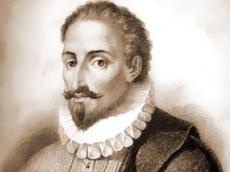|
|
TODAY.AZ / Weird / Interesting
Spain embarks on search for remains of Miguel de Cervantes
29 April 2014 [10:00] - TODAY.AZ
 Forensic scientists in Spain have announced plans to search a Madrid convent for the body of the 17th Century author, Miguel de Cervantes.
Forensic scientists in Spain have announced plans to search a Madrid convent for the body of the 17th Century author, Miguel de Cervantes.Ground-penetrating radar will be used to try to locate the remains of the celebrated author of Don Quixote.
Experts say the work of scanning, exhuming and analyzing any findings is expected to take several months.
Cervantes, who died in poverty in 1616, is considered one of Spain's most important literary figures.
He has been dubbed the father of the modern novel for writing The Ingenious Gentleman Don Quixote of La Mancha, which is reputed to be one of the most widely read and translated books on the planet.
Scientists say they will start searching for the famous author in the Convent of Trinitarians, Madrid, on Monday.
He was recorded as having died on 22 April 1616 and was said to have been buried a day later in the convent's church.
The precise location of his burial, however, is not known.
Forensic scientists say the ground and walls of the oldest part of the convent would be the focus of the search, using ground-penetrating equipment to map objects under the earth.
"The radar cannot tell you whether it is the body of the writer, but it can indicate the place of burial," the expert leading the search, Luis Avial, told reporters on Friday.
"The geo-radar can tell us that location... then comes the delicate work," he added, referring to the exhumation and identification process.
The estimated cost of the operation is 100,000 Euros ($138,000; £82,352).
/AzerTAc/
URL: http://www.today.az/news/interesting/133127.html
 Print version
Print version
Views: 2347
Connect with us. Get latest news and updates.
See Also
- 23 January 2025 [23:20]
Dubai once again named cleanest city in the world - 06 December 2024 [22:20]
Are scented candles harmful to health? - 23 November 2024 [14:11]
Magnitude 4.5 earthquake hits Azerbaijan's Lachin - 20 November 2024 [23:30]
Launch vehicle with prototype of Starship made its sixth test flight - 27 October 2024 [09:00]
Fuel prices expected to rise in Sweden - 24 October 2024 [19:14]
Turkiye strikes terror targets in Iraq and Syria - 23 October 2024 [23:46]
Kazakhstan supplied almost entire volume of oil planned for 2024 to Germany in 9 months - 23 October 2024 [22:17]
Taiwan reported passage of Chinese Navy aircraft carrier near island - 23 October 2024 [21:50]
Russia remains largest oil supplier to India - 16 October 2024 [17:54]
Gamesummit co-founder shares insights on future of gaming industry in Azerbaijan [EXCLUSIVE]
Most Popular
 Russia’s potential moves spark debate amid Tartus lease termination
Russia’s potential moves spark debate amid Tartus lease termination
 Macaron prepares for war with the United States
Macaron prepares for war with the United States
 Uzbek FM: Tashkent supports further strengthening of strategic relations with Baku & Ankara
Uzbek FM: Tashkent supports further strengthening of strategic relations with Baku & Ankara
 Russian ambassador to Azerbaijan summoned to Foreign Ministry
Russian ambassador to Azerbaijan summoned to Foreign Ministry
 Hikmet Hajiyev: Investigation into Azal plane crash continues, Azerbaijan in talks with Russia
Hikmet Hajiyev: Investigation into Azal plane crash continues, Azerbaijan in talks with Russia
 World Bank unveils 5-year strategy to boost Azerbaijan’s economy and sustainability
World Bank unveils 5-year strategy to boost Azerbaijan’s economy and sustainability
 Ankara Declaration strengthens trilateral cooperation between Azerbaijan, Türkiye, and Uzbekistan
Ankara Declaration strengthens trilateral cooperation between Azerbaijan, Türkiye, and Uzbekistan
